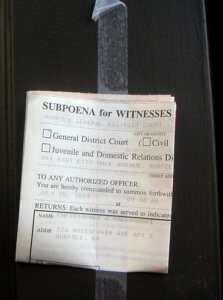Grand Jury Subpoena Attorney
You need a Grand Jury Subpoena Attorney Michael J. Petro immediately to help you through this difficult process. If you own your own business, you may receive a subpoena for business records at any time. You need a Grand Jury Subpoena Attorney Michael J. Petro immediately to help you through this difficult process. Contact Attorney Michael J. Petro

A subpoena duces tecum — or a subpoena for documents — requires you to submit requested paperwork in your possession that is relevant to the case in question. A subpoena is an Order of Court and should never be ignored! DOJ Guidelines for Issuing Subpoenas for Financial Records
Before you respond to a subpoena or submit any documents, consult with an experienced attorney. Michael J. Petro has a distinguished record of providing exceptional legal representation across a variety of practice areas. He assists both individuals and businesses in criminal matters, investigations, grand jury subpoenas, and appeals.
Subpoenas are complex legal documents, and they must be requested, prepared, and executed lawfully in order to be valid. By working with an experienced attorney, you can feel confident that you have covered every aspect of the legality of a request for your business records.
What components of the subpoena process will your attorney review?
The Subpoena Recipient
A subpoena that requests specific business documents must be directed to the appropriate person in your organization who possesses and administers those records. If the subject of the subpoena does not have authority over the records requested, your attorney may have a valid basis for a legal objection to quash the subpoena.
Types of business records that can be subject to subpoenas include contracts, meeting minutes, personnel records, company bylaws and charters, non-disclosure agreements, banking records, and other types of documents.
Legal Requirements For a Grand Jury Subpoena
Your attorney will ensure that a subpoena for business records meets all requirements under Illinois or Federal law. If the subpoena does not provide adequate time to gather the requested documents and respond, your attorney may object on that basis and request more time.
If you do not have possession of the requested documents, your attorney will need to respond to the court. In responding to the subpoena, your attorney will work closely with you to ensure that you provide only the requested documents and not related documents that are not part of the request.
Some documents requested in a subpoena may be privileged communication. If so, your attorney will file an objection with the court stating your right not to disclose those privileged communications. Documents relating to communications with an attorney, between a doctor and patient, or between spouses all may be subject to privilege.
If a subpoena asks for privileged documents, that request should be challenged in court, and you should not simply provide the documents. In addition, certain types of business information may be sensitive and valuable to the ongoing operation of your business. Trade secrets and intellectual property, for instance, could form the basis for an objection to a subpoena for business records.
Grand Jury Subpoenas Must Be Served To Be Valid
Subpoenas must be served by methods that follow state and federal laws. If you received the subpoena via hand delivery, it is subject to the rules of personal service. In all states, the individual who delivers the subpoena must be at least 18 years old. In addition, the party delivering the subpoena is required to sign and file a form with the court that describes the manner in which the document was delivered.
Subpoenas can also be delivered via postal mail, typically with certification. Your attorney can review the details of the postal delivery to ensure that it was executed properly. With all delivery methods, a proof of service form must be completed as confirmation that the subpoena was delivered to the intended recipient, and the forms must be submitted to the clerk of court.
Objecting to a Subpoena for Business Records
If you receive a subpoena for your business records, it’s important to consult with an experienced attorney to ensure that your rights are protected. Your attorney will review a variety of factors, including the types of documents requested, whether the subpoena was served properly, and whether proper notice of service was provided to the court.
In addition, your attorney will review whether providing the requested documents would reveal privileged communications or trade secrets vital to your business. Your attorney may object to the subpoena on your behalf and work to have the subpoena modified or quashed. If the subpoena for business documents stands, your attorney can argue before the court that the documents in question should not be submitted into evidence.
Contact Attorney Michael J. Petro or call 312-913-1111 for immediate help if you have received a subpoena for business records.